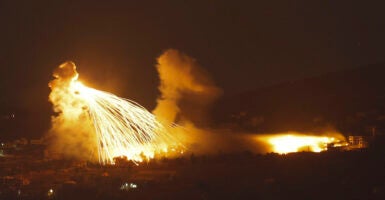It has been a year since the Israel-Hamas war broke out on Oct. 7, 2023. In the early morning hours, the terrorist organization Hamas launched surprise attacks in southern Israel. The blitzkrieg proved to be the bloodiest such attack in Israel’s history.
Hamas terrorists rampaged through towns and ravaged communities, killing 1,200 civilians, including 40 American citizens, while taking 251 hostages, 12 Americans among them. Israel responded swiftly and severely by invading the adjacent Gaza Strip, which is governed by Hamas.
A year on, the war in the Levant is on the cusp of becoming a broader regional war—or worse, a third world war. With Gaza reduced to rubble, Hamas in shambles, Hezbollah severely diminished, continued escalation in Lebanon, and an Israeli surge into the West Bank, the path now appears cleared for direct confrontation between Israel and Iran.
The United States looks on with bated breath as the Israelis reportedly plan to respond to Iran’s Oct. 1. attack on Israel, in which 180 ballistic missiles were fired but no casualties were reported. Iran’s attack appeared to be triggered by Israeli strikes on Beirut, which killed Hezbollah Secretary-General Hassan Nasrallah on Sept. 27, and Tehran, which killed Hamas political chief Ismail Haniyeh on July 31.
The U.S. administration of President Joe Biden and Vice President Kamala Harris has bumbled its way through the current crisis in the Middle East. The president assures that Israel has backing from the United States in one instant, then demands a cease-fire the next.
Israeli Prime Minister Benjamin Netanyahu seems comfortable with allowing the Biden-Harris administration to live with that apparent contradiction. Weapons continue to flow from the U.S. to Israel, and the U.S. continues to play an active role in thwarting missile attacks launched by Israel’s enemies.
Without exercising any of its leverage against the Israelis, the Biden-Harris administration is unlikely to negotiate a cease-fire agreement. Whenever the administration claimed negotiations were on the brink of a breakthrough, another round of attacks from both sides would send the parties back to the drawing board.
The Netanyahu government appears to think that cycle is amenable—at least until the U.S. presidential election on Nov. 5. The election seems to be a no-lose situation for Israeli interests, though one option is preferable to the other.
Harris, the Democratc nominee, likely would continue the Biden policy of tough rhetoric against Israel without follow through. Israel could continue to wage its war mostly unimpeded.
Given former President Donald Trump’s record with respect to Israel, the odds of a settlement that massively favors Israel would seem to skyrocket if Trump is elected to a second term.
Nevertheless, the Israeli government’s vested interest in the outcome of the November election still doesn’t explain how the war got to this point. All the Israelis needed to do to undercut the Biden-Harris administration’s effort to settle the war was to maintain the status quo.
Instead, Netanyahu has opted for a strategy of escalation in the past six months. Israel has widened its radius for missile strikes against enemy targets, hitting Beirut, Damascus, and Tehran. It has fully opened fronts in Lebanon against Hezbollah and in the West Bank.
Although Iran’s latest attack employed 180 ballistic missiles, the Iranians are factoring in Israel and its allies’ capabilities to shoot down projectiles when carrying out these attacks. Zero Israeli casualties in exchange for missile strikes in Tehran and Beirut that took out two of the Israel-Hamas war’s major players? In that light, Iran’s barrage seems fairly deescalatory.
Israel, however, likely will go forward with an attack on Iranian soil in the coming days. What assets Israel will target in that strike remains uncertain. What is certain, however, is that the Israeli government has the Biden-Harris administration’s blessing. “Make no mistake, the United States is fully, fully, fully supportive of Israel,” Biden said as Israel prepared to respond.
With Israel’s successes against Hamas and Hezbollah, Iran seems more vulnerable to attack now than at any time in recent memory. Iran’s own actions betray a lack of confidence that the Islamist regime could prevail in a war against Israel if it comes to it.
Ayatollah Ali Khamenei, despite his jihadist rhetoric, seems to understand that his regime would become the epicenter of regional destabilization if such a war came to pass. It’s simply not in Iran’s interest to escalate in the foreseeable future.
Rather, the Iranians’ best bet is to rebuild the capacity of its proxies, Hamas and Hezbollah, in order to keep Israel focused on them rather than Iran itself.
For the U.S., the top priority remains getting home the four U.S. citizens still held hostage by Hamas in Gaza. But if the Israeli response triggers a chain of escalatory events that risks destabilizing the region, the next U.S. president might be forced to redefine the U.S.-Israel relationship.
































